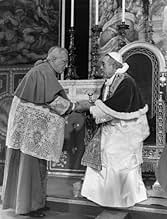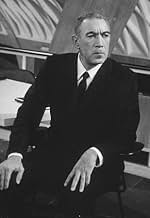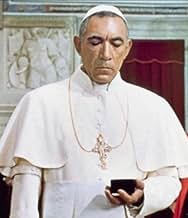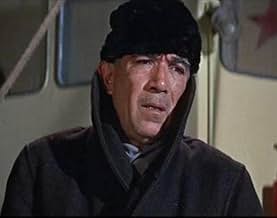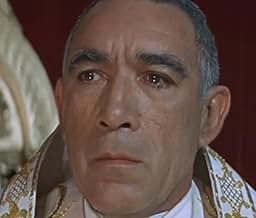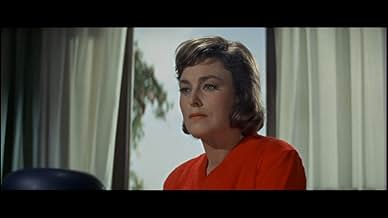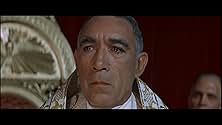After spending decades in a Siberian Gulag labor camp, Roman Catholic priest Kiril Lakota is set free by Russian leader Piotr Ilyich Kamenev at the height of the Cold War.After spending decades in a Siberian Gulag labor camp, Roman Catholic priest Kiril Lakota is set free by Russian leader Piotr Ilyich Kamenev at the height of the Cold War.After spending decades in a Siberian Gulag labor camp, Roman Catholic priest Kiril Lakota is set free by Russian leader Piotr Ilyich Kamenev at the height of the Cold War.
- Director
- Writers
- Stars
- Nominated for 2 Oscars
- 4 wins & 5 nominations total
- Piotr Ilyich Kamenev
- (as Sir Laurence Olivier)
- The Elder Pope
- (as Sir John Gielgud)
- Chiara
- (as Rosemarie Dexter)
- Gelasio
- (as Arnoldo Foa')
- Gorshenin
- (credit only)
- Director
- Writers
- All cast & crew
- Production, box office & more at IMDbPro
Featured reviews
It also a great example of life imitating art. Anthony Quinn is the former Archbishop of Lvov who was sent away for many years by the Communists to time in the Gulag. As a gesture of goodwill the Soviet Premier played Laurence Olivier gives him his release. Quinn and Olivier also have a history of their own, Olivier was the KGB official who interrogated Quinn back in the day and we know what their interrogation methods were like.
Upon reaching the Vatican, the Pope played by John Gielgud makes him a Cardinal. A few months later Gielgud dies and in the conclave to elect a new Pope, it's decided that Cardinal Quinn has some insight into an unbelieving part of the word that no one else possesses. So Quinn steps into The Shoes of the Fisherman.
So we have the first non-Italian Pope in 400 years as we shortly did in real life. Quinn inherits a world in crisis with China suffering from famine and threatening war against its neighbors to obtain food.
I can't reveal what Quinn actually did in the film, but it seems as though he took his cue from Pope Benedict XV who also tried to use his good office to end World War I and also organized relief efforts. In any event, he put it all on the line and I do mean all.
Tony Quinn and Laurence Olivier had a history of their own. They co-starred on Broadway in Becket with Olivier as Becket and Quinn as Henry II. Though there sure wasn't anything wrong with the film adaption that Richard Burton and Peter O'Toole did, it might have been nice to see the original cast perform this.
In fact my favorite in this film is Olivier. With the Soviet Union now broken up we can look back now and see the problems confronting each Soviet premier as they tried to hold their polyglot state of several republics together. Olivier's Kamenev is in the tradition of Leonid Brezhnev who was in charge at the time of the Soviet Union. It's with complete seriousness that the actor playing the Chinese premier calls him half a capitalist already. Of course when Mao died, the Chinese have become more than half capitalist themselves.
Others in the cast of note are Oskar Werner as a non-conforming Jesuit who espouses some heretical doctrine who Quinn finds intriguing and Leo McKern and Vittorio DeSica as a pair of politically astute Cardinals.
Good location shooting nicely blended with newsreel footage of crowd scenes give the film a real authenticity. I think Catholic viewers will like Shoes of the Fisherman especially.
The film draws the viewer into the movie with scenes we have often witnessed from St. Peter's Square of huge crowds at the time of a pope's death and the subsequent election of his successor. David Jansen is the erudite broadcaster talking to American audiences about the workings of the Vatican and the progress of events. There are the processions through the square, close-ups of statues around the square, puffs of black and white smoke telling onlookers the status of the balloting, and the tolling of bells. The movie goes behind the scenes and takes the viewer back to the square with the throngs waiting in anticipation until the drama is over. In this film, it reaches a finale with the coronation and in particular, the words of the new pope.
I found the pomp and pageantry and the sacred traditions surrounding the death of a pope and the election of a successor to be well described and displayed. The inquisitorial nature of the pontifical commission grilling the Oscar Werner character is what we are given to believe about the Vatican's treatment of theologians. Werner was outstanding in his role as an avant grade theologian breathing new life into church dogma against the rather staid and anti-intellectual Vatican insiders. Vittorio de Sica was excellent as the urbane Secretary of State. Leo McKern, as the conservative Cardinal Leone, was shown to be a man with some foresight and compassion. John Gielgud had a brief but impressive role as the aging pope welcoming Kiril Lakota to the Vatican. A large-scale movie with an excellent cast, I would gladly see the it again.
Soon after his arriving, the pope died. None of the 'favorites' were chosen for his successor. On the seventh vote Kiril was elected to be the new pope. He brought a different perspective to the Vatican than his colleagues were used to seeing. He didn't let his position go to his head, but rather wanted to get out of his confines and feel the pulse of the community. "We're all in prison one way or another." "What do you think of Christ?"
This movie did however make one point to me. Even though the Catholic Church is a system far from perfect, there are people in it who God is leading, who 'walk in the shoes of the Fisherman,' and who live unselfishly to help their fellow men in need. 'How does a man ever know if his actions are for himself or for God?" "You don't know. You have a duty to act, but you have no right to expect approval, or even a successful outcome."
Did you know
- TriviaIn the scene where Pope Kiril I (Anthony Quinn) prays over the body of the Jewish man, he recites the Shema. However, rather than say "Adonai," he says, "Hashem." This is because "Adonai" is traditionally only said when one is actually at prayer, and not simply reciting a prayer in a secular context, as in during a performance (specifically, in a movie).
- GoofsIn an on-air report, George Farber states, "after the sixth ballot, still only black smoke from the window of the Sistine Chapel." As a preceding shot demonstrated, the smoke rises from a stove pipe on the roof of the Sistine Chapel, not from a window.
- Quotes
George Faber: Were you permitted to practice your ministry as a priest?
Kiril Lakota: No, I - I practiced it without permission among my fellow prisoners.
George Faber: Do you see any hope then for the day when Christian faith, or more specifically the Roman Catholic faith, may be practiced freely in Marxist countries?
Kiril Lakota: I have no inside information as to how the Kingdom of God is going to be established.
- ConnectionsFeatured in The Shoes of the Fisherman (1968)
- How long is The Shoes of the Fisherman?Powered by Alexa
Details
- Release date
- Country of origin
- Languages
- Also known as
- Las sandalias del pescador
- Filming locations
- PalaLottomatico, Rome, Lazio, Italy(meeting with Chinese leader)
- Production company
- See more company credits at IMDbPro
- Runtime2 hours 42 minutes
- Sound mix
- Aspect ratio
- 2.35 : 1


